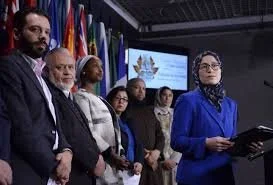Still pushing for personhood: 90 years after Canada recognized the rights of (some) women, what the fight looks like now, the Toronto Star
By Jenna Moon, Priya Ramanujam, Evelyn Kwong, Wanyee Li, Ayesha Nasir and Andrea Macdonald
It was the day when Canada finally recognized that yes, women were equal persons to men.
Days before the country again goes to the polls in Monday’s Federal Election, Canada on Friday celebrates the 90th anniversary of one of its most seismic political days.
In 1929, a group of women referred to as the Famous Five won a historic legal challenge that saw women designated legal “persons.” The ruling meant that women could be appointed to the Senate and paved the way for women to participate more fully in politics.
The fight had been a long one — the Supreme Court of Canada had initially ruled against the quintet — and it took intervention from Britain to overrule the decision. But for some the fight was only beginning. In effect, the Persons Day ruling only applied to some women.
Many women of colour were not granted full voting rights until the late 1940s — more than 30 years after it was originally granted to women in 1916. Indigenous women, meanwhile, were excluded from voting at a federal level until 1960.
On the 90th anniversary of “persons” status in Canada, the Star spoke with leaders from across the county and asked them: How can Canada do better to execute on its 1929 promise and how far is there still to go before women can participate equally, in politics and beyond?
The interviews have been edited and condensed.
Amira Elghawaby is a journalist and human rights advocate based in Ottawa.
It’s hard not to feel despondent about the state of women’s rights in Canada, 90 years after the Persons Case. Right now, one of the country’s largest provinces has stripped away the rights of countless numbers of women to both practise their faith and work in the public service. Bill 21 is Quebec’s provincial law barring any man or woman who wears a religious symbol from holding positions of authority, ranging from teachers to police officers, judges and prosecutors. While the law has impacted a number of religious communities, observers have suggested that the legislation’s real intent is to prohibit Muslim women, in particular, from wearing headscarves or face veils. “This Bill disproportionately targets women, and particularly Muslim women, impairing their equality rights and excluding them from being full participants in Québec society,” reads a statement by the Women’s Legal Education and Action Fund (LEAF).
Bill 21 will exacerbate how Muslim women are able to engage in the workforce, not only entrenching discrimination at the state level — but signalling to all of Quebec, and even the rest of Canada, that it is acceptable to treat some women as second-class citizens because of the clothing they choose to wear.
Overall, Muslim women in Canada are already often at an economic disadvantage. Statistics Canada’s 2016 General Social Survey shows that in 2016, 56 per cent of Muslim women were employed, as compared to 66 per cent of all women. We also know that newcomers to Canada who identify as Muslim are more likely to live in low-income (under $20,000) than immigrants of other religious backgrounds.
Canadians should therefore see Bill 21 as a full attack on both religious freedoms, and on the rights of women to fully and equally participate in society. We should be working harder to remove barriers to participation for all women, not only women who fit a biased ideal of what personhood and womanhood should look like.
The Canadian Women’s Foundation marked Equal Pay Day this past April by highlighting Statistics Canada numbers which show that:
Indigenous women face a 35 per cent gender pay gap
Women with disabilities (who work part time and full time) face a 46 per cent gender pay gap
Newcomer women face a 29 per cent gender pay gap
Racialized women face a 33 per cent gender pay gap
For the Persons Case to truly have resonance today, we need to hold governments to account for inaction on these issues.
We are not truly free to participate as equal members of society until all of us are truly free to do so. Our contributions mustn’t be shortchanged, either.
https://www.thestar.com/news/canada/2019/10/18/still-pushing-for-personhood-90-years-after-canada-recognized-the-rights-of-some-women-what-the-fight-looks-like-now.html
